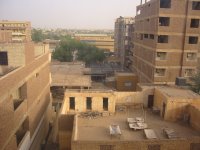We’ve just finished our second day here in Khartoum. Our time has been spent in briefings and initial interviews, and dealing with a mind boggling host of administrative issues. I needed to pass basic and advanced security tests in order to receive permission to travel to Darfur. The courses are actually quite interesting, dealing with a host of potential threats that one can come across and how one should try to reduce risks and respond to situations where threats have become a reality. The cases are not comforting and, of course, the security situation has deteriorated such that many of the scenarios are happening quite regularly. Therefore, I was glad to take the courses and I learned very interesting techniques, such as how to orient your north/south position using the sun.

Khartoum is a sprawling city, the colors of concrete and reddish sand. One can imagine that one would be standing in the middle of a desert, if one stripped away the structures. It is summer, and it is hot: around 113 F/45 C during the day. There are only rare breezes and when these arrive, they are often warmer than the still air. The soil bakes so that it goes down only to the 90s/30s in the evening. Thank goodness it is a dry heat, although I am sure that one can dehydrate quickly without being aware of this.
In the course of the past three days I have visited three UN offices: UNDP, UNFPA and UNMIS. The staff I have met so far are extremely hardworking and I admire them tremendously. They are multi-cultural and there is a high presence of Africans (both East and West Africa) and Asians (Indians, Pakistanis and Bangladeshi). As I walk through a building, I hear not only English, but also French and Arabic.
The political atmosphere at the UN includes public discussions on the use of a hybrid United Nations-African Union force to bring protection to Darfur civilians and enable humanitarian aid. At the end of May, such a proposal was made by UN Secretary-General Ban Ki-moon and today the news is that the UN and the AU leadership are close to reaching an agreement about how the proposed 23,000 peacekeepers would be constituted and managed. The Sudanese government refuses to consider an operation controlled solely by the United Nations, so a revised plan would increase the chances that such a force would be accepted. At this time, there are approximately 7,000 AU peacekeepers deployed in Sudan but they are widely viewed as ineffective.
Friday and Saturday are the weekend in Sudan, but we will be quite busy. Tomorrow there will be more meetings and on Saturday we travel to El Fasher, the main city in North Darfur. Darfur is constituted by three states and we will visit two of them – in the North and in the South. West Darfur has a more precarious security situation, so we will check the security reports before planning a trip.
